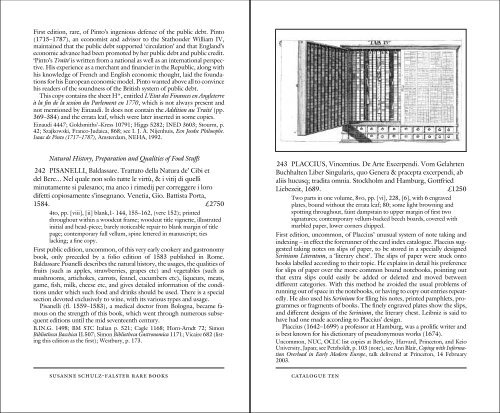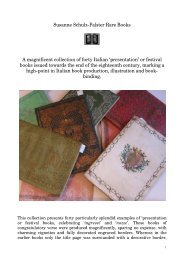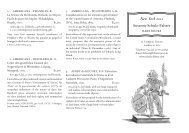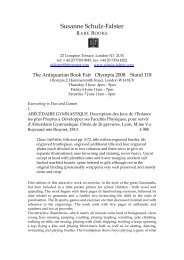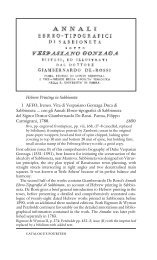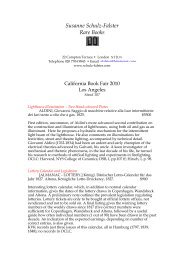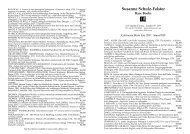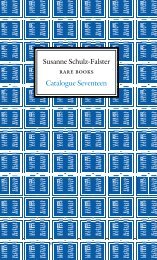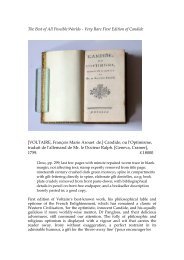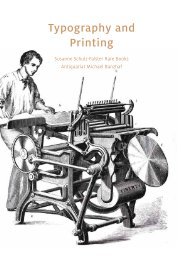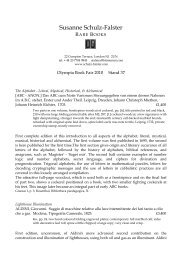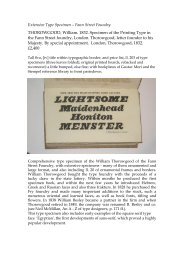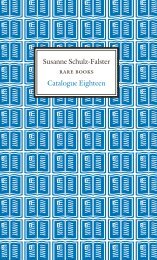Susanne Schulz-Falster Catalogue Ten - Schulz-Falster Rare Books
Susanne Schulz-Falster Catalogue Ten - Schulz-Falster Rare Books
Susanne Schulz-Falster Catalogue Ten - Schulz-Falster Rare Books
Create successful ePaper yourself
Turn your PDF publications into a flip-book with our unique Google optimized e-Paper software.
First edition, rare, of Pinto’s ingenious defence of the public debt. Pinto<br />
(1715–1787), an economist and advisor to the Stathouder William IV,<br />
maintained that the public debt supported ‘circulation’ and that England’s<br />
economic advance had been promoted by her public debt and public credit.<br />
‘Pinto’s Traité is written from a national as well as an international perspective.<br />
His experience as a merchant and Wnancier in the Republic, along with<br />
his knowledge of French and English economic thought, laid the foundations<br />
for his European economic model. Pinto wanted above all to convince<br />
his readers of the soundness of the British system of public debt.<br />
This copy contains the sheet H*, entitled L’Etat des Finances en Angleterre<br />
à la Wn de la session du Parlement en 1770, which is not always present and<br />
not mentioned by Einaudi. It does not contain the Addition au Traité (pp.<br />
369–384) and the errata leaf, which were later inserted in some copies.<br />
Einaudi 4447; Goldsmiths’–Kress 10791; Higgs 5282; INED 3603; Stourm, p.<br />
42; Szajkowski, Franco-Judaica, 868; see I. J. A. Nijenhuis, Een Joodse Philosophe.<br />
Isaac de Pinto (1717–1787), Amsterdam, NEHA, 1992.<br />
Natural History, Preparation and Qualities of Food StuVs<br />
242 PISANELLI, Baldassare. Trattato della Natura de’ Cibi et<br />
del Bere... Nel quale non solo tutte le virtù, & i vitij di quelli<br />
minutamente si palesano; ma anco i rimedij per correggere i loro<br />
difetti copiosamente s’insegnano. Venetia, Gio. Battista Porta,<br />
1584. £2750<br />
4to, pp. [viii], [ii] blank,1- 144, 155–162, (vere 152); printed<br />
throughout within a woodcut frame; woodcut title vignette, illustrated<br />
initial and head-piece; barely noticeable repair to blank margin of title<br />
page; contemporary full vellum, spine lettered in manuscript; ties<br />
lacking; a Wne copy.<br />
First public edition, uncommon, of this very early cookery and gastronomy<br />
book, only preceded by a folio edition of 1583 published in Rome.<br />
Baldassare Pisanelli describes the natural history, the usages, the qualities of<br />
fruits (such as apples, strawberries, grapes etc) and vegetables (such as<br />
mushrooms, artichokes, carrots, fennel, cucumbers etc), liqueurs, meats,<br />
game, Wsh, milk, cheese etc, and gives detailed information of the conditions<br />
under which such food and drinks should be used. There is a special<br />
section devoted exclusively to wine, with its various types and usage.<br />
Pisanelli (X. 1559–1583), a medical doctor from Bologna, became famous<br />
on the strength of this book, which went through numerous subsequent<br />
editions until the mid seventeenth century.<br />
B.IN.G. 1498; BM STC Italian p. 521; Cagle 1168; Horn-Arndt 72; Simon<br />
Bibliotheca Bacchica II.507; Simon Bibliotheca Gastronomica 1171; Vicaire 682 (listing<br />
this edition as the Wrst); Westbury, p. 173.<br />
susanne schulz-falster rare books catalogue ten<br />
243 PLACCIUS, Vincentius. De Arte Excerpendi. Vom Gelahrten<br />
Buchhalten Liber Singularis, quo Genera & pracepta excerpendi, ab<br />
aliis hucusq; tradita omnia. Stockholm and Hamburg, Gottfried<br />
Liebezeit, 1689. £1250<br />
Two parts in one volume, 8vo, pp. [vi], 228, [6], with 6 engraved<br />
plates, bound without the errata leaf; 80; some light browning and<br />
spotting throughout, faint dampstain to upper margin of Wrst two<br />
signatures; contemporary vellum-backed beech boards, covered with<br />
marbled paper, lower corners chipped.<br />
First edition, uncommon, of Placcius’ unusual system of note taking and<br />
indexing – in eVect the forerunner of the card index catalogue. Placcius suggested<br />
taking notes on slips of paper, to be stored in a specially designed<br />
Scrinium Literatum, a ‘literary chest’. The slips of paper were stuck onto<br />
hooks labelled according to their topic. He explains in detail his preference<br />
for slips of paper over the more common bound notebooks, pointing out<br />
that extra slips could easily be added or deleted and moved between<br />
diVerent categories. With this method he avoided the usual problems of<br />
running out of space in the notebooks, or having to copy out entries repeatedly.<br />
He also used his Scrinium for Wling his notes, printed pamphlets, programmes<br />
or fragments of books. The Wnely engraved plates show the slips,<br />
and diVerent designs of the Scrinium, the literary chest. Leibniz is said to<br />
have had one made according to Placcius’ design.<br />
Placcius (1642–1699) a professor at Hamburg, was a proliWc writer and<br />
is best known for his dictionary of pseudonymous works (1674).<br />
Uncommon, NUC, OCLC list copies at Berkeley, Harvard, Princeton, and Keio<br />
University, Japan; see Petzholdt, p. 103 (note), see Ann Blair, Coping with Information<br />
Overload in Early Modern Europe, talk delivered at Princeton, 14 February<br />
2003.


